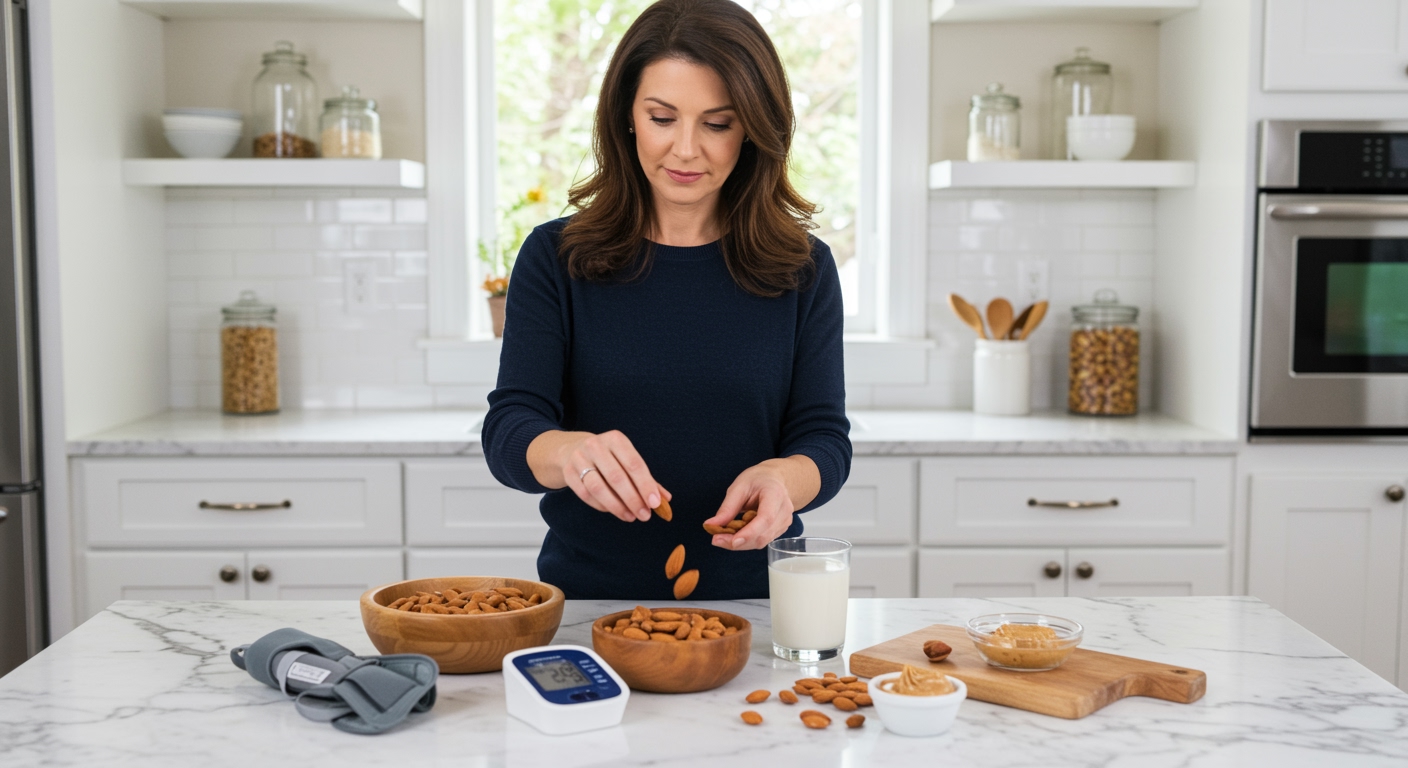✪ Key Takeaway: Almonds may help normalize blood pressure but are not effective for raising dangerously low blood pressure levels.
Introduction
You grab a handful of almonds thinking they will help your low blood pressure problem.
Many people with hypotension wonder if almonds can actually raise their blood pressure to healthier levels, especially after hearing so much about nuts and heart health.
Hi, I am Abdur, your nutrition coach and today I am going to explain exactly how almonds affect low blood pressure and what you should expect from including them in your diet.
What Happens When You Eat Almonds With Low Blood Pressure?
Almonds contain magnesium and potassium that work together to relax your blood vessels.
When your blood vessels relax, blood flows more easily through them with less resistance.
This mechanism typically helps people with high blood pressure, but it creates a different effect for those with hypotension.
Your body needs adequate pressure to pump blood effectively to all organs, especially your brain and heart.
Almonds provide healthy fats and protein that support overall cardiovascular function, but they do not contain compounds that specifically increase blood pressure.
Research shows that regular almond consumption tends to have a neutral to slightly lowering effect on blood pressure readings.
✪ Fact: One ounce of almonds contains 76 mg of magnesium, which is about 20% of your daily needs.
Do Almonds Actually Help Low Blood Pressure Symptoms?
Almonds can help manage some symptoms associated with low blood pressure through their nutrient density.
The protein and healthy fats in almonds provide sustained energy that prevents the fatigue often experienced with hypotension.
When your blood sugar remains stable from eating almonds, you avoid the energy crashes that make low blood pressure symptoms feel worse.
Almonds also contain vitamin E and antioxidants that support healthy blood vessel function.
However, almonds cannot address the root cause of chronically low blood pressure or provide the immediate relief needed during hypotensive episodes.
The sodium content in almonds is minimal, which means they will not help increase blood volume or pressure through salt retention.
✪ Pro Tip: Pair almonds with a small amount of sea salt if you need to increase sodium intake for low blood pressure.
How Much Should You Eat For Blood Pressure Benefits?
The optimal serving size for almonds is about one ounce or roughly 23 whole almonds per day.
This amount provides beneficial nutrients without excessive calories that could lead to unwanted weight gain.
People with low blood pressure should focus on eating almonds as part of balanced meals rather than as isolated snacks.
Combining almonds with foods that naturally support healthy blood pressure creates a more comprehensive approach.
You can eat almonds at any time of day, but consuming them with breakfast helps maintain steady energy levels throughout the morning.
Avoid eating large quantities of almonds at once, as this can cause digestive discomfort and may interfere with the absorption of other important nutrients.
✪ Note: Soaking almonds overnight makes them easier to digest and may improve nutrient absorption.
What Foods Work Better For Raising Blood Pressure?
Foods with higher sodium content are more effective for people who need to raise their blood pressure safely.
Olives, pickles, and naturally fermented foods provide sodium along with beneficial probiotics for overall health.
Caffeinated beverages like coffee or green tea can provide temporary increases in blood pressure through vasoconstriction.
Foods rich in folate and vitamin B12 support healthy red blood cell production, which helps maintain adequate blood volume.
Lean proteins and iron-rich foods prevent anemia, which can contribute to low blood pressure symptoms.
Small, frequent meals help prevent the blood pressure drops that often occur after eating large meals, a condition called postprandial hypotension.
✪ Pro Tip: Drink 16 ounces of water before meals to help prevent blood pressure drops after eating.
The Bottom Line
Almonds are nutritious nuts that support overall cardiovascular health, but they will not effectively raise dangerously low blood pressure levels.
Good nutrition is about choosing the right foods for your specific health needs, not following generic advice that may not apply to your situation.
I would love to hear about your experience with managing low blood pressure through diet, so please share your questions or thoughts in the comments below.
References
At NutritionCrown, we use quality and credible sources to ensure our content is accurate and trustworthy. Below are the sources referenced in creating this article:





